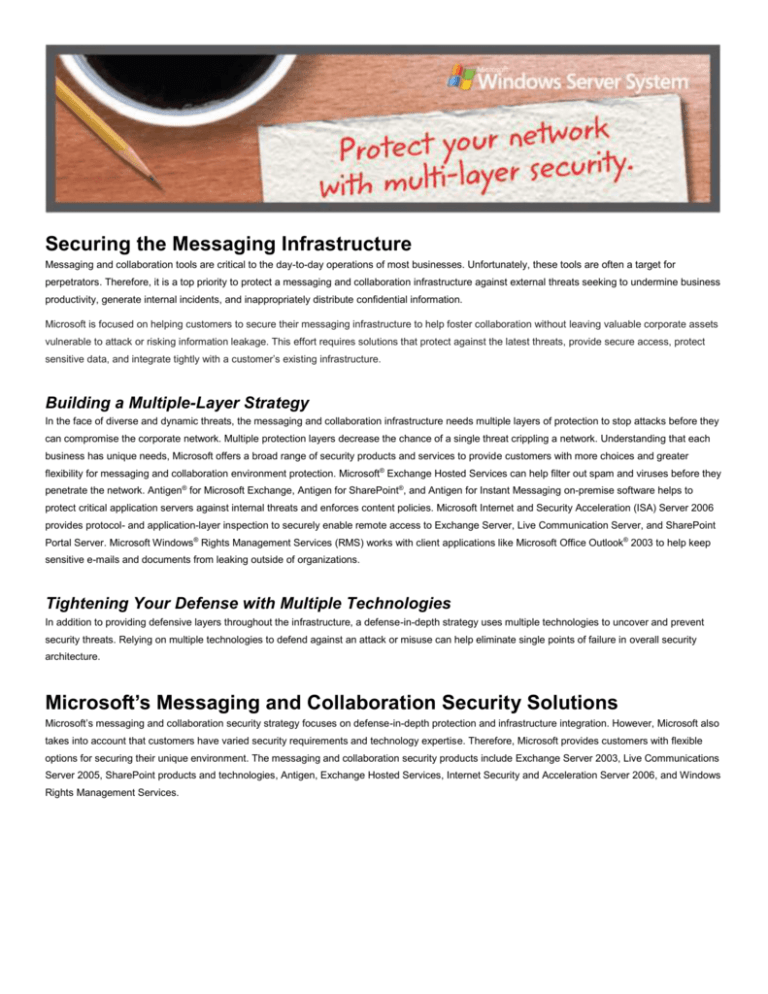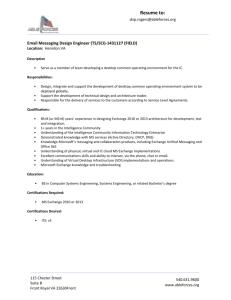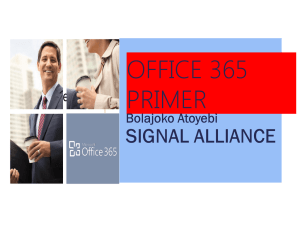
Securing the Messaging Infrastructure
Messaging and collaboration tools are critical to the day-to-day operations of most businesses. Unfortunately, these tools are often a target for
perpetrators. Therefore, it is a top priority to protect a messaging and collaboration infrastructure against external threats seeking to undermine business
productivity, generate internal incidents, and inappropriately distribute confidential information.
Microsoft is focused on helping customers to secure their messaging infrastructure to help foster collaboration without leaving valuable corporate assets
vulnerable to attack or risking information leakage. This effort requires solutions that protect against the latest threats, provide secure access, protect
sensitive data, and integrate tightly with a customer’s existing infrastructure.
Building a Multiple-Layer Strategy
In the face of diverse and dynamic threats, the messaging and collaboration infrastructure needs multiple layers of protection to stop attacks before they
can compromise the corporate network. Multiple protection layers decrease the chance of a single threat crippling a network. Understanding that each
business has unique needs, Microsoft offers a broad range of security products and services to provide customers with more choices and greater
flexibility for messaging and collaboration environment protection. Microsoft® Exchange Hosted Services can help filter out spam and viruses before they
penetrate the network. Antigen® for Microsoft Exchange, Antigen for SharePoint®, and Antigen for Instant Messaging on-premise software helps to
protect critical application servers against internal threats and enforces content policies. Microsoft Internet and Security Acceleration (ISA) Server 2006
provides protocol- and application-layer inspection to securely enable remote access to Exchange Server, Live Communication Server, and SharePoint
Portal Server. Microsoft Windows® Rights Management Services (RMS) works with client applications like Microsoft Office Outlook® 2003 to help keep
sensitive e-mails and documents from leaking outside of organizations.
Tightening Your Defense with Multiple Technologies
In addition to providing defensive layers throughout the infrastructure, a defense-in-depth strategy uses multiple technologies to uncover and prevent
security threats. Relying on multiple technologies to defend against an attack or misuse can help eliminate single points of failure in overall security
architecture.
Microsoft’s Messaging and Collaboration Security Solutions
Microsoft’s messaging and collaboration security strategy focuses on defense-in-depth protection and infrastructure integration. However, Microsoft also
takes into account that customers have varied security requirements and technology expertise. Therefore, Microsoft provides customers with flexible
options for securing their unique environment. The messaging and collaboration security products include Exchange Server 2003, Live Communications
Server 2005, SharePoint products and technologies, Antigen, Exchange Hosted Services, Internet Security and Acceleration Server 2006, and Windows
Rights Management Services.
Exchange Server
Competing successfully in today's challenging business climate requires more efficient ways for knowledge workers to communicate and collaborate. Email is currently the most widely used collaborative technology. More businesses use Exchange Server for e-mail based collaboration than any other
product. Exchange Server 2003 provides knowledge workers access to critical business communications almost whenever and wherever needed, and
delivers greater security, availability, and reliability. Key benefits include:
Antivirus and Anti-Spam Protection.
Built-in, comprehensive antivirus, anti-spam, and anti-phishing capabilities
Frequent and automatic junk e-mail filter and antivirus signature updates
Seamless integration with Exchange Hosted Services, offering offsite protection for security, archiving, compliance, and availability outside of
a network
Security and Privacy.
Ensures trusted e-mail flow and client connectivity by default
Automatically establishes secure business to business communications through encryption
Protects sensitive information in-transit without the public key infrastructure complexity
Increased Mobility.
Mobile and remote workers can communicate and collaborate on the go
Helps ensure mobile security with remote and local device wipe and corporate device policy settings
Outlook Web Access (OWA) enables access to shared documents stored on SharePoint systems and universal naming convention (UNC)
network shares behind the corporate firewall without requiring a secure tunnel (VPN connection) into the corporate network
SharePoint Products and Technologies
Microsoft SharePoint products and technologies enable enterprises to develop an intelligent portal that seamlessly connects users, teams, and
knowledge so that people can utilize relevant information across business processes to help them work more efficiently. SharePoint Portal Server 2003
provides an enterprise business solution that integrates information from various systems into one solution. This is done through single sign-on and
enterprise application integration capabilities, as well as with flexible deployment options and management tools. The key benefits include:
Easy Deployment and Administration.
Windows SharePoint Services scales from a single computer deployment to a server farm deployment with multiple front-end and back-end
computers
Site collection administrators can block users from uploading specified file types when adding attachments or files to document libraries
Robust system monitoring, usage tracking and monitoring tools help isolate and solve problems faster, and improve the operational efficiency
of the system infrastructure
Secure Group Collaboration.
Life cycle management functionality such as expiration policies and end-of-life actions define how long a document should exist and what to
do with it when it reaches end-of-life
A user or site manager can add an alert to a list or a specific list item to generate an e-mail notification when changes are made
Documents can be reserved by individual users for updating purposes
Live Communications Server
Microsoft Office Live Communications Server (LCS) 2005 with Service Pack 1 provides a powerful, scalable, enterprise-grade instant messaging (IM)
and integrated presence solution. It is part of a scalable, enterprise-grade solution offering enhanced security, seamless integration with other Microsoft
products, and an extensible, industry-standard development platform. Key benefits include:
Security and Privacy.
Transport Layer Security (TLS) encryption for IM traffic for PC to PC, and PC to LCS server connections
Mutual Transport Layer Security (MTLS) encryption for IM traffic between LCS servers
RTP/RTCP encryption for audio and video traffic
Optional text message logging
Real-Time Collaboration.
Ability to connect multiple remote users, organizations and partners using federation
Remote users connect using SIP over TLS eliminating the need for full VPN access
Connects securely to other organizations and partners without third party gateway requirements
Infrastructure Integration.
Cross-forest authentication with Windows Server 2003
Kerberos and NTLM for single sign-on authentication
Microsoft Operations Manager 2000 and 2005 and Microsoft Management Console support
Active Directory® service integration
Exchange Hosted Services
Exchange Hosted Services offer managed messaging services for enforcing e-mail compliance and improving e-mail security. The complete line of
services includes message archiving, spam and virus filtering, disaster recovery, and e-mail encryption. Exchange Hosted Services help businesses
filter out spam and viruses before they reach the network. Key benefits include:
Cost and Complexity Management.
Services deployed “in the cloud,” requiring no upfront capital investment
Minimal IT administration, enabling organizations to focus on other competencies
Security, Protection, and Compliance.
Multi-layer approach to anti-spam and antivirus eliminates threats before they reach the corporate firewall
Offsite e-mail indexing and archiving for compliance
Inbox Availability and Access.
Global network of data centers performance-backed by service level agreements
Fully functional backup e-mail system for disaster recovery
Microsoft Antigen
For businesses that prefer on-premise protection over managed services, Antigen for SMTP Gateways and Advanced Spam Manager help protect
message traffic against the latest viruses, worms, and spam before they penetrate the network. And for any business running Exchange Server, Antigen
for Exchange helps protect against internal threats and enforce content policies. Antigen for SharePoint and Antigen for Instant Messaging extend this
protection for SharePoint and Live Communications Server environments, providing protection that extends across the entire messaging and
collaboration environment. For document libraries and IM conversations, Antigen products also provide keyword and file filtering technologies that
prevent harmful or inappropriate content from being shared, helping enforce corporate policies for all communications mechanisms including e-mail. The
key benefits include:
Protection Against the Latest Threats.
Multiple virus-scanning engines for enhanced protection
Frequently updated, signature-based anti-spam engine
Downtime and Increase Productivity Prevention.
Uninterrupted e-mail delivery; even if one scanning engine fails or goes offline to update, other engines continue to scan
Server Demand Reduction.
In-memory scanning, multi-threaded scanning processes
Configurable performance bias settings
Availability and Control Assurance.
Central configuration, deployment, updating, and reporting
Integration with Microsoft Operations Manager for monitoring
ISA Server 2006
ISA Server 2006 complements traditional firewall solutions already deployed by adding an application-layer of firewall protection. This is an ideal
benefit for organizations looking to ensure the most secure connectivity to Exchange Server services such as Microsoft Office Outlook Web Access.
The key benefits include:
Protection Against the Latest Threats.
Application-layer filtering, which helps ensure that only Exchange Server traffic that is verified as safe passes through the firewall
Improved protection against common network-layer attacks through packet filtering
More Secure Remote Access to Exchange Server.
Wizards, templates, and tools help administrators set up services such as Outlook Web Access and avoid common configuration mistakes
Easier authentication with native support for Microsoft Active Directory policies
Maximum Scalability and Availability.
Greater deployment flexibility through the choice of a software solution or a preconfigured server appliance solution
Improved scalability and availability through centralized management and integrated network load balancing
Windows RMS
Windows RMS for Windows ServerTM 2003 is information protection technology that works with RMS enabled applications to help safeguard digital
information from unauthorized use, both online and offline, inside and outside of the firewall. Information workers can define exactly how the recipient
can use the information, such as who can open, modify, print, forward, and/or take other actions with the information. RMS augments an organization’s
security strategy by protecting information through persistent usage policies that remain with the information, no matter where the information goes. The
key benefits include:
Digital Organizational Policy Enforcement.
Enforces digital policy to help prevent misuse of sensitive information after delivery
Allows only authorized access based on Active Directory users and groups
Persistent Protection for Sensitive Data.
Embeds fine-grained usage policies into the content including print, view, edit, expiration, etc.
128-bit content encryption secures transmission and storage of sensitive information wherever it goes
Risk Reduction and Compliance.
Helps organizations comply with information protection and access control requirements with regulations such as HIPPA, SB1386, and
Graham Leach Bliley
Provides auditing and tracking capabilities
To best protect your messaging infrastructure, Microsoft and its partners recommend multiple layers of defense. Understanding that each business has
unique needs, Microsoft offers a broad range of security products and services to provide customers with more choices and greater flexibility for
messaging environment protection. Go to www.microsoft.com/securemessaging for a free trial of Exchange Hosted Services, Antigen for
Exchange, Antigen for IM, Antigen for SharePoint, ISA Server 2006, or Windows RMS.
© 2006 Microsoft Corporation, All rights reserved. Microsoft, Active Directory, Antigen, SharePoint, Outlook, Windows, the Windows logo, and Windows Server are either registered trademarks or
trademarks of Microsoft Corporation in the United States and/or other countries. 0106 Part No. 009-93698







